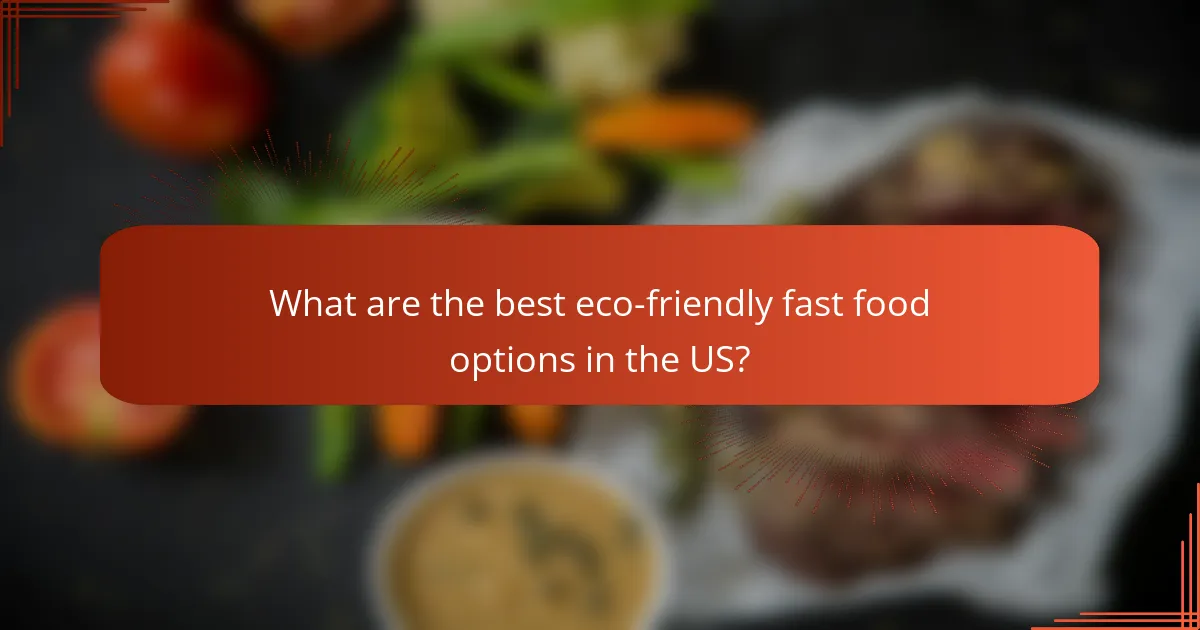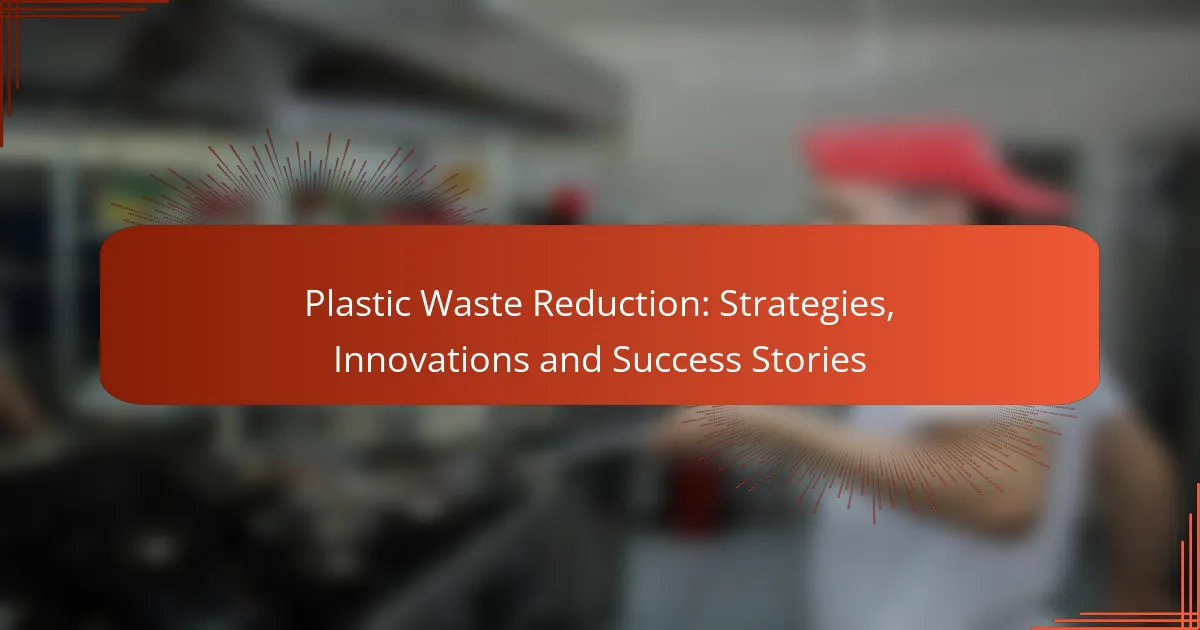As the demand for sustainable dining grows, many fast food chains are embracing eco-friendly practices by prioritizing sustainable sourcing and clean ingredients. Notable brands like Chipotle, Panera Bread, and Starbucks are at the forefront, offering meals that align with environmental initiatives. Understanding certifications can help consumers make informed choices, ensuring that their meals are both delicious and ethically produced.

What are the best eco-friendly fast food options in the US?
The best eco-friendly fast food options in the US prioritize sustainable sourcing, clean ingredients, and environmentally conscious practices. Chains like Chipotle, Panera Bread, and Starbucks are leading the way in offering meals that not only taste good but also support eco-friendly initiatives.
Chipotle’s commitment to sustainable sourcing
Chipotle emphasizes sustainable sourcing by using ingredients that are responsibly raised and grown. They prioritize meats from animals that are raised without antibiotics or added hormones and source produce from local farms whenever possible.
Their commitment extends to their supply chain, where they work to ensure that ingredients are grown with minimal environmental impact. This includes using organic and non-GMO ingredients, which helps reduce chemical usage in farming.
Panera Bread’s clean ingredients policy
Panera Bread has a strong clean ingredients policy, eliminating artificial preservatives, sweeteners, and flavors from their menu. They focus on transparency, providing customers with detailed information about their food sourcing and preparation methods.
They also offer a variety of plant-based options, making it easier for customers to choose meals that are not only healthy but also environmentally friendly. Their commitment to sustainability includes sourcing ingredients from suppliers that practice responsible farming.
Starbucks’ eco-friendly practices
Starbucks implements several eco-friendly practices, including using ethically sourced coffee beans certified by organizations like Fair Trade and Rainforest Alliance. They aim to reduce their environmental footprint through initiatives like recycling and reducing waste in their stores.
Additionally, Starbucks has committed to reducing single-use plastics by offering reusable cup discounts and encouraging customers to bring their own containers. Their efforts reflect a broader commitment to sustainability and responsible sourcing in the fast food industry.

How do certifications impact eco-friendly fast food?
Certifications play a crucial role in identifying eco-friendly fast food options by ensuring that products meet specific environmental and ethical standards. They help consumers make informed choices by providing transparency about sourcing, production practices, and ingredient integrity.
USDA Organic certification significance
The USDA Organic certification indicates that food products are made from ingredients grown without synthetic pesticides, fertilizers, or genetically modified organisms (GMOs). This certification also ensures that livestock are raised without antibiotics or growth hormones, promoting animal welfare and sustainable farming practices.
Fast food chains that offer USDA Organic options often highlight this certification to appeal to health-conscious consumers. When selecting organic items, look for the USDA seal on packaging to ensure compliance with these rigorous standards.
Non-GMO Project Verified importance
The Non-GMO Project Verified label signifies that a product has been tested and meets strict standards for avoiding genetically modified organisms. This certification is particularly relevant for consumers who prioritize natural ingredients and wish to avoid potential health risks associated with GMOs.
Fast food establishments that feature Non-GMO options often cater to a growing market of consumers seeking transparency in their food sources. When choosing Non-GMO items, check for the seal to confirm that the product aligns with your dietary preferences.
Fair Trade certification benefits
Fair Trade certification ensures that producers in developing countries receive fair compensation for their goods, promoting ethical sourcing and sustainable practices. This certification often applies to coffee, tea, and chocolate used in fast food, highlighting the importance of supporting equitable trade relationships.
Fast food chains that offer Fair Trade products contribute to social and economic development in farming communities. When selecting Fair Trade options, look for the certification label to support ethical consumption and sustainable agriculture.

What ingredients should you look for in eco-friendly fast food?
When seeking eco-friendly fast food, prioritize ingredients that are sustainably sourced and ethically produced. Look for certifications and labels that indicate environmentally friendly practices, as well as transparency regarding the origins of the ingredients.
Locally sourced produce
Locally sourced produce is a key component of eco-friendly fast food, as it reduces transportation emissions and supports local farmers. When choosing fast food options, look for restaurants that highlight their use of seasonal fruits and vegetables from nearby farms.
Additionally, local sourcing often means fresher ingredients, which can enhance flavor and nutritional value. Ask about the origins of the produce to ensure it aligns with your eco-friendly values.
Grass-fed beef options
Grass-fed beef is a more sustainable choice compared to conventionally raised beef, as it typically requires less grain and has a lower environmental impact. When selecting fast food, look for establishments that offer grass-fed beef, as it often comes from farms that practice rotational grazing, which benefits soil health.
While grass-fed options may be slightly more expensive, they can provide better flavor and nutritional benefits, including higher omega-3 fatty acids. Always inquire about the sourcing practices to ensure they meet your standards.
Plant-based protein alternatives
Plant-based protein alternatives are increasingly popular in eco-friendly fast food, offering a lower carbon footprint compared to animal products. Options like lentil burgers, chickpea patties, and tofu can provide satisfying meals while being kinder to the environment.
When choosing plant-based options, look for those with minimal processing and recognizable ingredients. Many restaurants now feature these alternatives prominently, making it easier to make sustainable choices without sacrificing taste.

How do fast food chains implement sustainable practices?
Fast food chains implement sustainable practices by adopting strategies that minimize environmental impact, enhance resource efficiency, and promote eco-friendly habits. These practices often include waste reduction, energy efficiency, and the use of sustainable packaging materials.
Waste reduction strategies
Waste reduction strategies in fast food chains focus on minimizing food waste and optimizing resource use. Many chains implement inventory management systems to track food freshness and reduce overproduction, which can lead to spoilage.
Additionally, some restaurants partner with local food banks to donate surplus food, ensuring that edible items do not end up in landfills. Implementing composting programs for organic waste further supports these efforts.
Energy-efficient operations
Energy-efficient operations involve using technology and practices that reduce energy consumption. Fast food chains often invest in energy-efficient appliances, such as ovens and fryers, which can cut energy use by significant margins.
Many establishments also adopt practices like LED lighting and smart thermostats to optimize heating and cooling, further lowering their energy footprint. Regular maintenance of equipment ensures these systems operate at peak efficiency.
Eco-friendly packaging solutions
Eco-friendly packaging solutions focus on reducing plastic use and increasing recyclability. Many fast food chains are transitioning to biodegradable or compostable materials for their food containers and utensils, which helps decrease plastic waste.
Some chains also encourage customers to use reusable containers by offering discounts, promoting a culture of sustainability. Clear labeling on packaging about recycling options can guide consumers in proper disposal practices, enhancing overall environmental responsibility.

What are the criteria for selecting eco-friendly fast food?
Eco-friendly fast food options are determined by their adherence to specific criteria that prioritize environmental sustainability. Key factors include ingredient transparency, supply chain sustainability, and the overall impact of practices on the ecosystem.
Ingredient transparency
Ingredient transparency refers to the clear communication of what goes into food products. Eco-friendly fast food chains often provide detailed information about their ingredients, including sourcing practices and potential allergens.
Look for restaurants that disclose their ingredient lists and highlight organic or locally sourced items. Certifications like USDA Organic or Non-GMO Project Verified can also indicate a commitment to quality and sustainability.
Supply chain sustainability
Supply chain sustainability involves ensuring that all stages of food production, from sourcing to delivery, minimize environmental impact. This includes practices such as reducing carbon footprints, using renewable energy, and supporting fair labor practices.
When evaluating fast food options, consider those that prioritize local suppliers to reduce transportation emissions and support community economies. Certifications like Fair Trade or Rainforest Alliance can further signify a commitment to sustainable sourcing.

How do eco-friendly fast food options compare in pricing?
Eco-friendly fast food options often come at a higher price point compared to conventional choices. This difference is largely due to the costs associated with sustainable sourcing, organic ingredients, and ethical practices.
Price differences between conventional and eco-friendly options
Generally, eco-friendly fast food can be 10-30% more expensive than traditional fast food. For example, a standard burger might cost around $5 at a conventional outlet, while a sustainably sourced version could range from $6 to $8. This price increase reflects the higher costs of organic ingredients and environmentally friendly packaging.
However, the price gap can vary significantly based on location and the specific restaurant chain. Some establishments may offer competitive pricing for eco-friendly items to attract environmentally conscious consumers.
Value of sustainable sourcing
Sustainable sourcing provides long-term benefits that can justify the higher prices of eco-friendly fast food. By choosing ingredients that are locally sourced or certified organic, these options support local economies and reduce carbon footprints. This practice can lead to fresher ingredients and better taste, enhancing overall customer satisfaction.
Additionally, many consumers are willing to pay a premium for eco-friendly options, recognizing the positive impact on the environment. This growing demand encourages more fast food chains to adopt sustainable practices, potentially leading to lower prices in the future as these methods become more mainstream.

What are emerging trends in eco-friendly fast food?
Emerging trends in eco-friendly fast food focus on sustainable sourcing, plant-based options, and environmentally responsible practices. These trends reflect a growing consumer demand for healthier, more sustainable food choices that minimize environmental impact.
Certifications for Eco-Friendly Fast Food
Certifications play a crucial role in identifying eco-friendly fast food options. Look for labels such as USDA Organic, Fair Trade, and Rainforest Alliance, which indicate adherence to sustainable practices. These certifications ensure that ingredients are sourced responsibly and that production methods are environmentally friendly.
Fast food chains are increasingly adopting these certifications to appeal to environmentally conscious consumers. For example, a restaurant offering USDA Organic ingredients demonstrates a commitment to organic farming practices, which can reduce pesticide use and promote biodiversity.
Ingredients in Eco-Friendly Fast Food
Eco-friendly fast food emphasizes the use of organic, locally sourced, and plant-based ingredients. This approach not only supports local economies but also reduces the carbon footprint associated with transportation. Ingredients such as whole grains, seasonal vegetables, and plant proteins are commonly featured in these menus.
When choosing eco-friendly fast food, prioritize options that highlight transparency in ingredient sourcing. For instance, a burger made from grass-fed beef or a salad featuring locally grown produce can be more sustainable than conventional alternatives.
Practices of Eco-Friendly Fast Food Chains
Eco-friendly fast food chains implement various practices to minimize their environmental impact. These may include using biodegradable packaging, reducing food waste, and implementing energy-efficient cooking methods. Many chains are also investing in renewable energy sources for their operations.
To support these practices, consumers can look for restaurants that actively promote their sustainability efforts. For example, a chain that participates in community recycling programs or offers discounts for customers who bring reusable containers demonstrates a commitment to eco-friendly practices.



